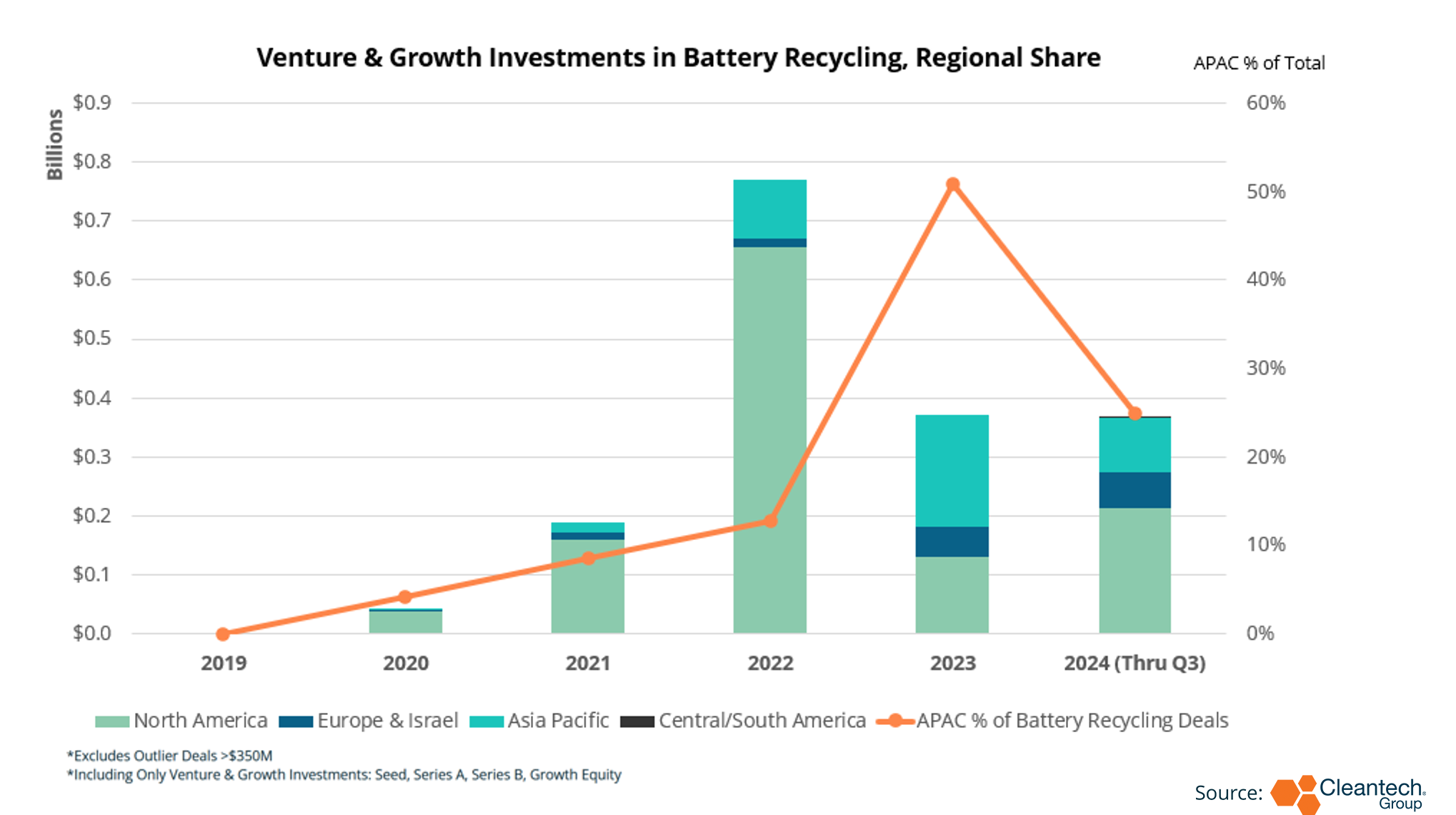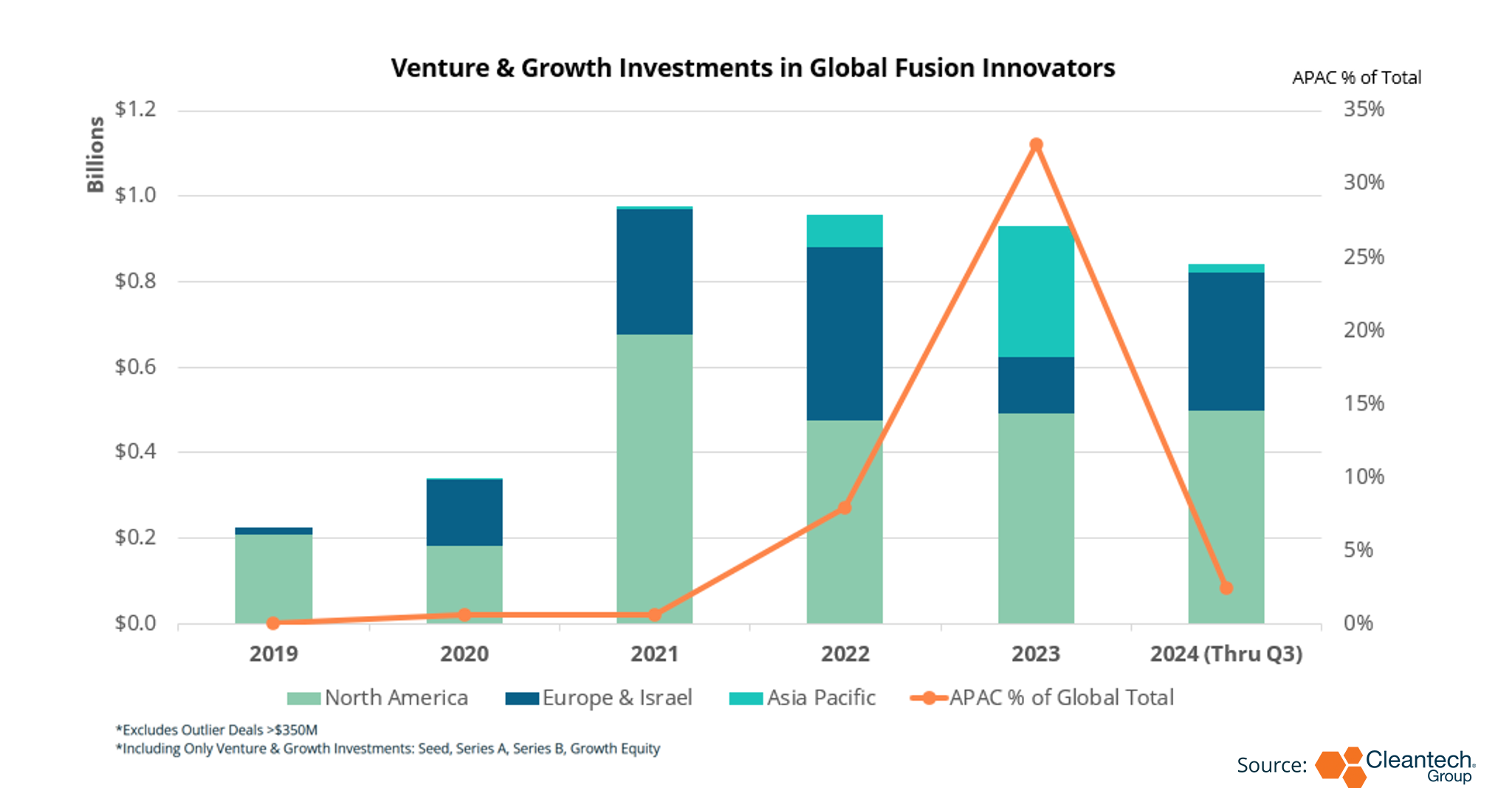Asia-Pacific’s cleantech dynamic through 2024 has marked an ecosystem preparing for a pivot to the next sectors of promise as the powerhouse sectors of the past few years (solar, batteries) have exited the equity financing continuum into bankable scalability. Last quarter, we saw standouts in textiles sustainability and low carbon heavy-duty trucking, while this quarter showed steps in different directions with stand-out strengths in aviation and a bump in battery recycling and e-waste circularity.

APAC VToLs Experience a Take-off Quarter
Despite the challenges being experienced by vertical take-off and landing (VToL) and electric vertical take-off and landing (EVTol) companies globally of late (Read: Lilium’s recent insolvency filing), Q3 2024 saw a quarter in which APAC-based innovators led the global landscape of unmanned aerial vehicles (UAVs) and VToLs in fundraising.

A new Chinese emphasis on the “low-altitude economy” may be showing its face in the innovation space for the first time. The country in 2023 named the low-altitude economy – activities taking place 1,000 meters or below in airspace – a priority economic growth area for the remainder of the 2020s. Short-distance passenger transport, cargo, and light logistics are areas hypothesized to be target markets within the low-altitude economy.
Shanghai-based Volant Aerotech raised a $100M Series B round in August, the second raise of 2024 for the company, who brought in a $14M Series A round just two months earlier. The company states in its fundraising announcement that, “The proceeds will be used to speed up the development and manufacturing of eVTOL aircraft, the airworthiness certification of the VE25-100 model, and promote the commercialization of high-level commercial passenger eVTOL vehicles.”
Xpeng subsidiary Aero HT raised a $150M round from undisclosed investors in September. The funding will be to open a factory in Guangzhou, China. Aero HT is developing small electric aircraft strictly for human transport, and offers a product with a “ground module” electric vehicle and “air module” small EVToL.
Zerog, a Chinese EVToL company with multiple human transport-oriented models, closed a $15M round in August.

The human transport theme in EVToLs is not limited to China, either. Japanese innovator Skydrive raised $55M in a Growth Equity round, following a significant, $83M grant from the Japanese Ministry of Economy, Trade & Industry (METI) in 2023. Skydrive’s most recent fundraise is slated to support continued development of its three-seat SD-05 personal transport model which, according to the company’s fundraising announcement, has a concrete near-term motivator:
“Osaka Metro, which operates subway trains and trams, is cooperating with SkyDrive in plans to demonstrate the eVTOL aircraft during the Expo 2025 event the Japanese city will host. The public transportation company has agreed to develop and operate a vertiport outside the Expo venue,” (AINOnline.com).

Skydrive Development Timeline. Source: Skydrive
Battery Materials Remain a Thematic Strength in APAC
We have noted over the past few years that strengths in batteries and related supply chains in APAC have begun to range much further than lithium-ion manufacturing in China. To be sure, the advantages those producers in China have remain in place, but there is a trend of innovation in recycling of electronic waste that is extending beyond China and forming the basis for localized supply chains around Asia-Pacific.

- Korean battery recycler Poen raised a $28M Series B in August. Poen “remanufactures” batteries by running a diagnostics process to identify spent and damaged cells, and then disassembles batteries to swap spent cells for new ones, before re-assembling and inspecting for performance.
- In July, Indian battery recycler Lohum announced a purchase of 65 acres of land to begin work on a 20 GWh recycling plant, that is slated to begin operations in 18 months. Lohum raised $54M earlier this year in an effort to scale recycling operations. The new plant will recycle 20,000 tonnes of batteries per year to produce cobalt, nickel, and lithium.
Elsewhere in the circular economy for clean energy products, Australian solar cell and e-waste recycler Sircel completed its first ever financing round, a $5M Seed round to accelerate nationwide development. Sircel operates triage facilities where it determines whether end-of-life products meet requirements for a second use or should be sent through Sircel’s hydrometallurgical materials recovery process.
Investments in APAC-based Fusion Companies – Will They Bounce Back?

A surprising area of low activity in Asia-Pacific this year has been nuclear fusion. In 2023 it appeared that APAC had finally arrived on the scene, with major rounds by Chinese fusion innovators NEO Fusion and Energy Singularity and Kyoto Fusioneering in Japan. This year, while the fusion space is on track to have its best investment year in recent memory (excluding outlier deals >$350M), APAC has played a noticeably small role.
Kyoto Fusioneering, did, however, raise an additional $6.9M in July, it’s second round of the year ($9.9M in April), with the July round including investment from In-Q-Tel, the investment fund that is partnered with U.S. security agencies such as the Department of Homeland Security and Central Intelligence Agency.
HHMAX Energy (Hanhai Juneng), a Chinese fusion innovator experimenting with high-density field reversal configurations, raised its first round, a $1.4M Seed in August.
As the world’s energy demands pick up, and the search continues for more long-term sources of clean, baseload power, we will certainly expect to see fusion investments grow, but the question of where APAC will play in the global mix remains an open question.


